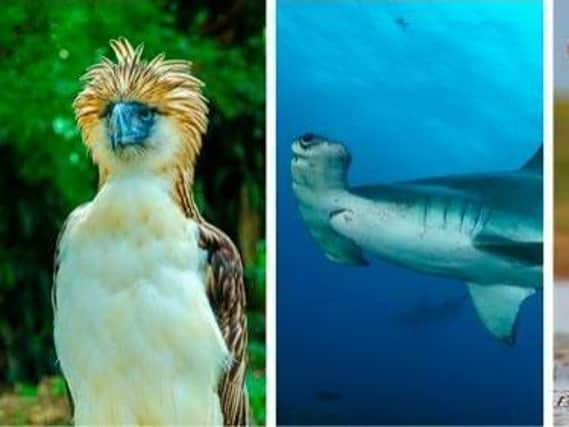Lancaster friends charity wants to keep the wild weird and help save the strange species


The team at Weird and Wonderful Animal Conservation (WAWA) have selected three critically endangered species that represent land, sky and sea; the Saiga Antelope, the Philippine Eagle and the Scalloped Hammerhead Shark.
The first campaign will raise funds to be donated straight to conservation projects working on the ground (or air or sea!) with these species.
Advertisement
Hide AdAdvertisement
Hide AdThe saiga is an ancient desert dwelling antelope whose crazy nose allows it to live in one of the largest temperature ranges on the planet (-40 in winter to +40 in summer).
WAWA will be helping The Saiga Conservation Alliance and their field monitoring project where a mix of scientific research and community engagement efforts are used to survey the habitat, breeding and health of these unusual looking antelopes.
For the Saiga Conservation Alliance, £80 could buy enough gasoline to fuel the rangers’ motorbike patrols for a whole season.
The second species aided by WAWA’s campaign is the scalloped hammerhead shark, a beautiful mystery of the deep whose weird appearance is matched by its unique social behaviour which has unfortunately contributed to their own downfall as large groups are caught in fishing nets when they gather.
Advertisement
Hide AdAdvertisement
Hide AdThe funds raised by WAWA will be donated to Galapagos Conservation Trust’s Endangered Sharks of the Galapagos project which aims to research and create safe ways for at-risk shark species to birth and migrate in a protected environment.
For the Endangered Sharks of the Galapagos Project, £35 could help researchers create and analyse four hours of remote camera shark footage.
The colossal, blue-eyed apex predator of the Philippines, and one of the most endangered eagles in the world, completes the trio that WAWA will be supporting.
Funds raised will go to the Eagle Research Project at the Philippine Eagle Foundation, and their field monitoring project, tagging, tracking and monitoring the species in the wild.
Advertisement
Hide AdAdvertisement
Hide AdFor the Eagle Research Project £100 could cover the fees of two guides for ten days of eagle monitoring during which invaluable data can be collected to inform effective conservation action.
During the six week fundraising drive, WAWA hopes to raise enough funds to make a real difference to these three important projects. The campaign began on November 13 2020 and donations can be made through wawa.org.uk.
Jack Haines, the Chairman of WAWA Conservation, said: “I’m so excited for WAWA to get started. I think we are filling the much discussed yet little addressed gap in the world of wildlife conservation.
"The icons of the wild, those which we were all taught about as children, and those that are regularly the focal points of nature documentaries, tend to get all the attention and a similarly disproportionate amount of conservation support.
Advertisement
Hide AdAdvertisement
Hide Ad"While this is great news for the likes of the giant panda, which has been downgraded thanks to the exceptional conservation attention it has received, this does little to help the likes of the Hispaniolan solenodon that is just as important to its ecosystem and has unique genetics that once lost will not be seen again on this planet.
"We want to keep the wild weird and help save the strange species that make this world such an incredible and beautiful place to be.”
Comment Guidelines
National World encourages reader discussion on our stories. User feedback, insights and back-and-forth exchanges add a rich layer of context to reporting. Please review our Community Guidelines before commenting.